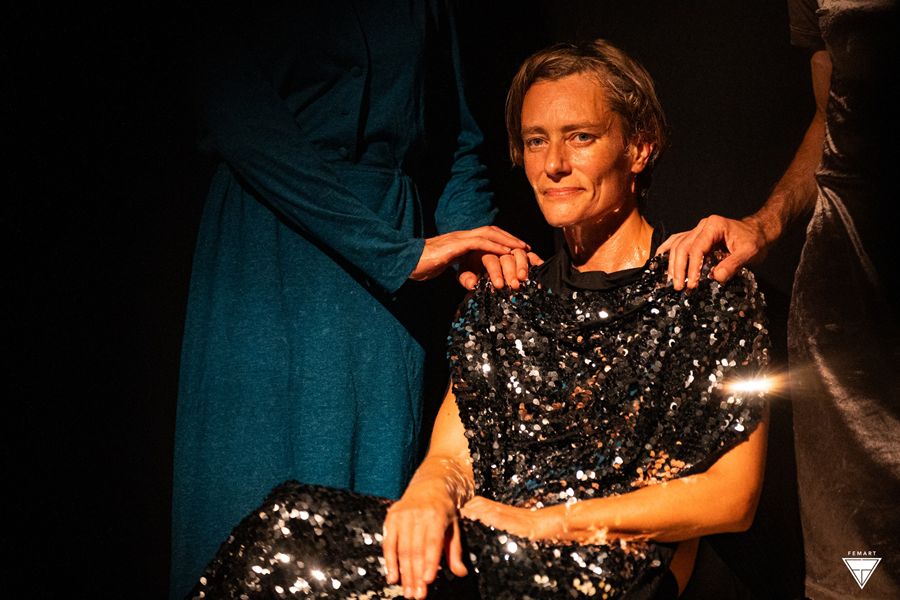By: Shqipe Malushi
Day 4. FemArt Festival 12: Sonny
Theater Performance, Slovenia
19:00-20:30, Dodona Theatre, Prishtina
Author & Performer: Nataša Živković
Performers: Daniel Petković, Loup Abramovici, Slobodan Malić
Space design and scenography: Lenka Dorojević
Lighting design and technical direction: Špela Škulj
Photography: Nada Žgank
Advising: Teja Reba
Executive Production: Eva Prodan
Production: City of Women
Co-Production: Bunker-Old Power Station
In the dusky glow of the stage, a figure sat cloaked in a glittering black shroud, still as a statue, shrouded in mystery. The air hummed with anticipation. A low, aching voice broke the silence, calling softly, “Sonny, Sonny, my son.” And with that, the veil was cast away, revealing a woman dressed in men’s clothing, her movements calculated and firm—each step a deliberate mimicry of masculinity. She ran her fingers through her hair, her body radiating a hawk-like confidence, flirting openly with the audience, embodying a man in every breath.
And then, she spoke, her voice breaking the tension. “My name is Lule. I was born a girl.” Thus began the story of the Burneshat—Sworn Virgins—who chose to abandon their womanhood in exchange for the freedoms men held in Northern Albania, Montenegro, and the Balkans. As Lule paced the stage, her face, her body, and even her essence shifted between man and woman, as though the very act of storytelling reshaped her form. She recounted the tale of a girl who, alongside her brothers, wanted to take up the mantle of burnesha, to be the man of the house, to support her father—a rebellion against both her brothers and tradition.
As the story unfolded, two men, dressed as women, emerged from the shadows, carrying water-filled buckets. Silently, they approached men in the audience, kneeling before them, offering to wash their feet—a ritual that embodied the deeply ingrained submissiveness of women in these societies. The weight of the Kanun—the ancient Albanian code governing every aspect of life—hung in the air. The Kanun, which bound women to lives of objectification, stripped of rights, and reduced to vessels. The laws of Kanun may no longer hold legal power, but its shadow lingers, a haunting reminder of the imbalance between genders, where men dominate, and women are little more than accessories.
Through her movements, her voice, and her silence, Nataša Živković conveyed the painful sacrifice of many of these women—women who became men, not out of desire, but out of necessity, calling each name for each story. They sought to protect their families’ honor, forsaking their own. As the men, dressed as women, knelt to wash the feet of their counterparts, one man in the audience refused. A subtle yet powerful moment, it felt like an act of resistance, a spark of defiance against the tradition.
Nataša’s portrayal of the Burneshat was nothing short of breathtaking, seamlessly shifting between the various men she embodied—gun-wielding, chain-smoking, abstaining from marriage and children, standing among the men as their equal, if not their superior. But beneath the surface, the woman simmered. Her suppressed desires, her hidden longings, could not be entirely silenced. In a mesmerizing dance, Nataša’s body twisted and contorted, her movements reflecting the anguish of a woman denied. As she shed the layers of her male disguise, nearly naked, she unleashed a primal, unrestrained dance—a dance of liberation, where her womanhood, long imprisoned, fought to break free. It was a dance of need, of desires long denied, of dreams silenced by the heavy chains of tradition.
The performance ended as it began—with her seated, draped once more in her glittering cloak. But this time, the woman spoke directly to us, sharing the journey that had led her here. “I’ve done thorough research on the sworn virgins,” she explained. “These women chose a man’s life not just to escape oppressive traditions, but to gain freedom. By becoming men, they escaped the suffocating roles imposed upon them.”
As the applause faded, a voice from the audience—an anonymous woman—challenged her. “You didn’t portray their intention correctly,” she said gently. “It wasn’t about freedom. It was sacrifice—for their families, for their honor.”
Nataša welcomed the feedback with grace. “Everything I’ve read led me to believe they sought freedom,” she replied. “But I’m open to learning more.”
And so, as the lights dimmed once more, we were left with the lingering echo of her performance. It wasn’t just a tale of gender or tradition—it was a meditation on the human condition, on the cost of freedom, on the quiet wars waged within the soul. Nataša had left us all questioning the meaning of freedom, the weight of honor, and whether true equality could ever be realized in a world still bound by invisible chains.

